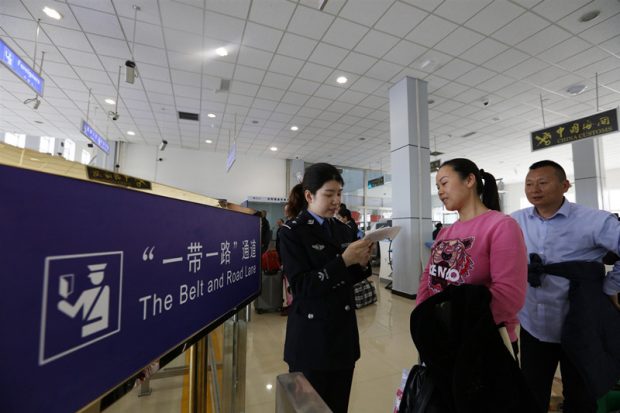
China sets up special passages at 18 ports to fast track exit-entry procedures for BRI-related people

Starting from April 28, 12 Chinese airports including those in Beijing and Shanghai, six road ports in Manzhouli in North China’s Inner Mongolia Autonomous Region and Khorgas in Northwest China’s Xinjiang Uyghur Autonomous Region, will set up special Belt and Road passages to facilitate exit-entry procedures for people involved in the initiative. Qu Yunhai, deputy director of the State Immigration Administration made the announcement on April 28 during a joint press conference in Beijing by the Ministry of Public Security and the State Immigration Administration.
Qu said that such special passages are designed to facilitate exit and entry document issuance for Chinese and foreign personnel and vehicles that come in and out of China to perform key projects and key cooperation under the Belt and Road Initiative (BRI), according to a press release the Ministry of Public Security sent to the Global Times on Sunday, April 28. For foreigners who intend to come to China to participate in major events, conferences and key construction projects under the BRI and do not have time to get a valid entry visa in advance, they can apply for a port visa with certification materials approved by the Chinese competent departments, it said. The time limit for the exit and entry departments of the public security organ to issue residence permits will be shortened from 15 working days to five working days for foreign personnel coming to China to cooperate on BRI projects with spouses and young children.
The airports involved include ones in Beijing, Shanghai, Guangzhou and Urumqi in Xinjiang, and the road ports include Manzhouli in Inner Mongolia and Youyiguan Border Port in Pingxiang, South China’s Guangxi Zhuang Autonomous Region. A total of 18 ports will have such special passages. For foreign crew members who carry out maritime BRI transport missions, if they need to apply for a stay permit to leave the port cities by transferring to different means of transportation, the time for the document issuance will be reduced from seven days to three days. Those who have urgent requirements can obtain the document on the day of acceptance, Qu said. Jia Tongbin, an official with the State Immigration Administration’s department in charge of managing foreigners, revealed that nearly 80 percent of international trade comes through maritime transport, and Chinese ports made up nine out of the top ten busiest ports in 2018.
By Deng Xiaoci
(People’s Daily)


